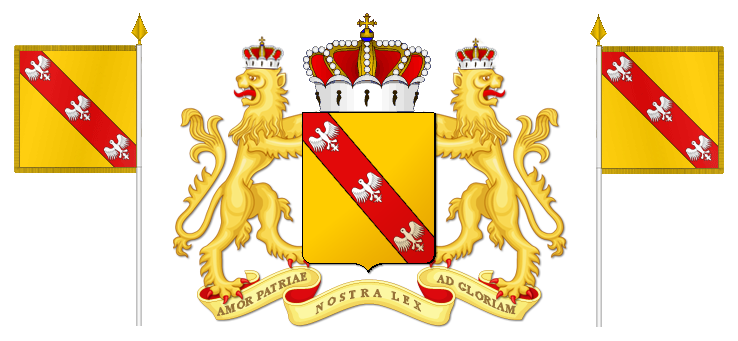Invité
Invité
 |  Sujet: Traité de coopération judiciaire - Cornwall Sujet: Traité de coopération judiciaire - Cornwall  Lun 29 Jan 2007 - 10:43 Lun 29 Jan 2007 - 10:43 | |
| - Citation :
- Traité de coopération judiciaire entre les Cornouailles et la Lorraine
- Citation :
- Dans leur sagesse, les sires Kremroat, Duc de la Lorraine, et Syounger,Comte de Cornouailles, souhaitent exprimer leur amitié par l'établissement d'un traité de coopération judiciaire liant les peuples de Cornouailles et de la Lorraine afin de préserver cette amitié pour longtemps.
Article I
1. En acceptant de signer ce traité de coopération judiciaire, les parties contractantes acceptent que nul ne doit échapper aux procédures légales ni à l'autorité de son Comte/Duc sur ses terres.
2. Un citoyen accusé sur l'un ou l'autre comté doit subir les lois et coutumes du pays où l'offense a été commise.
Article II
1. Si une personne accusée s'échappe d'un territoire allié par ce traité pour fuir a Justice, il sera soit extradé, soit jugé en accord par les autorités judiciaires compétentes du pays où il aura été arrêté.
Le jugement "en accord" implique une totale coopération entre les juges et procureurs des 2 comtés afin que le défendant reçoive le jugement qu'il aurait reçu s'il n'avait pas fui.
Une défense compétente sera également fournie par le Comté où il aura été arreté.
2. La procedure sera la suivante :
- Accusation sur demande du comté tenant juridiction pour le crime commis. Celui-ci fournira au procureur du duché jugeant l'Acte d'Accusation ainsi que les preuves contre l'accusé (celles-ci devront etre fournie au préalable).
- L'entière procédure sera sous la juridiction primaire du comté demandant. Le juge local écrira la sentence en son âme et conscience, mais fournira les motivations de sa décision au Comté demandant.
- Une entière collaboration est requise entre les autorités compétentes afin de garantir un respect mutuel des lois des 2 comtés.
Article III
1. Les membres de chacun des conseils ainsi que leur successeurs sont contractuellement obligés de respecter ce traité.
Le non-respect d'une clause de ce traité libère l'autre partie de toute obligation jusqu'à ce qu'une compensation ou un accord puisse etre trouvé.
2. Une annulation unilatérale de ce présent traité en temps de paix doit respecter la procédure suivante , sinon, ce sera considéré comme un acte hostile et peut entrainer une réponse de la partie offensée.
3. Pour annuler: Une missive du Comte sera adressée a l'autre Comte . Une déclaration officielle et formelle sera alors publiée dans les gargottes respectives et les ambassades.
4. L'annulation ne stoppera pas les procédures en cours dans l'un ou l'autre Comté et jugement sera rendu.
5. Toute annulation unilatérale en temps de guerre sera considérée comme Trahison et pourra mener à des représailles.
6. Des modifications totales ou partielles de ce présent traité peuvent être décidé par consentement mutuel.
Signé à l'ambassade de Lorraine le...13 janvier 1455
Au nom du Duché de Lorraine:Duc Kremroat
Hazgard, Chancellier lorrain
Nalfein de la Maison T'Sarran, Ambassadeur Lorrain pour le Cornwall

Au nom du Comte du Cornwall:Syounger, Bishop of Portsmouth, Duke of Cornwall, Baron of Tywardreath;
Talwin Tudor, Ambassadeur du Cornwall aupres de la Lorraine.

- Citation :
- Judicial Cooperation Treaty between Cornwall and Lorraine
In their almighty wisdom, the Lords Syounger, Count of Cornwall, and Kremroat, Duc of Lorraine, wished to express their friendship by establishing a judical treaty binding Lorraine and Cornwall citizens to preserve that friendship over years.
Article I
1. Upon the signing of this Judicial treaty, the contracting parties agree that no one should flee from legal proceedings or attempt escape from his Duke/County's authority on his/her lands.
2. A citizen accused in one or both counties must follow the laws and customs where the offence was commited.
Article II
1. If an accused person flees from a territory allied by this treaty in an attempt to flee justice, he will be either extradited or judged, by mutual agreement by duly apointed judical authorities upon who's lands he was arrested. Concerning the mutual agreement, it implies a full cooperation between prosecutors and judges from both countries in order that the defendant receive a judgment he would have received if he hadn't fled. The accused should also be provided a competent defence council by the Country in which he was arrested.
2. The procedure will be the following :
- Indictment on demand by the Duchy/County holding jurisdiction over the crime commited. Requesting Duchy/County prosecutor will write the bill of indictment. Proof of Evidence against the accused will be required from the Requesting Duchy/County to the responding Duchy prior to posting of any indictment.
- The whole procedure is under the primary jurisdiction of the requesting duchy. The Local responding Judge will write the sentence, but will show motives of his decision following the law of the requesting duchy.
- Collaboration is required between juridical authorities from both duchies in order to keep the laws of both the requesting and responding Duchies respected
Article III
1. Lords, their heirs, and successors are contractually obligated to respect the entire treaty. Disregard of any clause(s) within this treaty frees the other party of his commitment until a compensation is made/or agreements can be reached.
2. A unilatteral cancellation of present treaty in a peacetime context should respect the following order, otherwise, it would be assumed as a hostile act and could lead to a response by the offended party.
3. To Cancel: A mail from the Duke/Count will be sent to the other Duke/Count, then an official and formal declaration will be published in the other duchy's Inn. Copies should be posted in the Embassies as well
4. Cancellation won't stop procedures already in progress between either duchy and will continue until judgement is rendered.
5. Any unilateral cancellation in a war situation will be assumed as a treason act and could lead to full retaliation
6. A full or partial rewriting of the treaty or even his cancellation can be decided by mutual consent.
Signed at the embassy of Cornwall on 13th January 1455
In the name of Cornwall County: Syounger, Bishop of Portsmouth, Duke of Cornwall, Baron of Tywardreath

In the name of Lorraine Duchy: Duc Kremroat
Hazgard, Head of Lorraine Ambassy
Nalfein of T'Sarran House, Lorraine Ambassador to Cornwall
 [/quote] |
|
